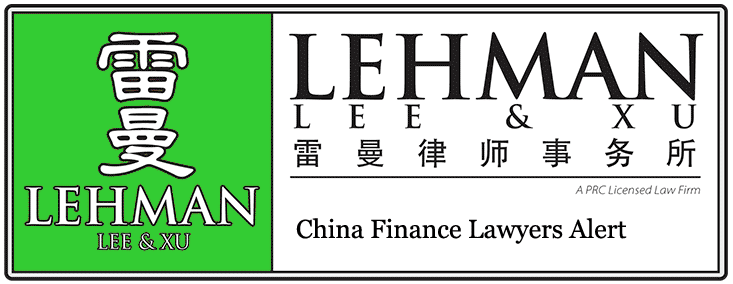
 |
|
LEHMAN, LEE & XU China & Mongolian Lawyers
|
|
China Finance Lawyers Alert
|
|
November 2012
|
The China Law News keeps you on top of business, economic and political events in the China. |
|
|
|
In the News |
Here’s what Ottawa’s new rules on foreign takeovers by state-owned buyers could look like |
CALGARY — Squeezed between public alarm over increasing ownership of Canadian resources by state-owned entities and investors demanding their payday, Prime Minister Stephen Harper has promised new rules to ensure Canadians don’t get short-changed.
|
Laos Says China to Finance Rail Link |
Laos's Energy and Mining Minister Soulivong Dalavong said in an interview that under the new agreement, which is expected to be signed within days, Chinese banks will provide financing to build a 418-kilometer rail link from the capital Vientiane to the Chinese border. Beijing is seeking to secure raw materials from neighboring countries to feed massive infrastructure investment and its manufacturing industry. Other projects already built, under construction or planned include twin oil and gas pipelines from nearby Myanmar, a crude pipeline from eastern Siberia and a railway project to bring in coal from Mongolia. A revival of the railway link would come amid uncertainty over a $15 billion bid by China's state-owned energy giant Cnooc Ltd. 0883.HK -0.98%to take over Nexen Inc., NXY.T +0.30%one of Canada's largest independent energy producers, prompted by the Canadian government's ruling last week against Malaysian national oil company Petroliam Nasional Bhd.'s acquisition of Progress Energy Resources Corp., PRQ.T +0.43%and worries in some Western countries about the scale of Chinese investments globally in energy and mining assets. In return for financing the project, China will secure supply of around 5 million tons a year of mineral resources, mainly potash, by 2020, along with other raw materials such as timber and agricultural products that may be shipped to China, Mr. Dalavong said. The link, which will be built mainly by Chinese contractors, is also expected to serve as a passenger route, Mr. Dalavong said. The minister said the railway will run north through the towns of Phonhong, Vangvieng, Luang Prabang Oudomxay and Luang Namtha before reaching the Chinese border. It is unclear which Chinese banks will provide the financing. An article by the Vientiane Times posted on the Laos government's website quoted Laotian Deputy Prime Minister Somsavat Lengsavad as saying the credit line will be provided by state-owned Export-Import Bank of China. Exim Bank did not respond to requests for comment. The move to more closely tie Laos to China comes as neighboring Myanmar is moving in the opposite direction—cutting some economic links with China and opening itself to investment from Western countries by instituting a series of political reforms. "Everyone is selling to China, so why shouldn't we do the same," Mr. Dalavong said, saying the country has limited opportunities for exports due to its land-locked geography and infrastructure. "I think we have to sell to China," he said. Laos—a small Southeast Asian country locked between China, Vietnam, Myanmar, Cambodia and Thailand—has gained some attention in recent years due to its significant untapped mineral resources. Although now mainly a producer of copper and gold, it has 10 mines under development that will produce potash, a key ingredient in fertilizer production, along with other minerals like iron ore, zinc and lead. Total production is expected to reach close to 7 million tons a year, with most of this destined for China via the planned railway. The long-discussed project, which was approved by the Laotian parliament last week, was originally presented as being jointly owned with the Chinese government. But according to the Vientiane Times, the Laotian government has now assumed sole ownership of the project, which it considers central to the future development of the nation. Initial plans envisaged a high-speed railway, but due to the mountainous terrain extending through about two-thirds of the route, the link will carry passenger trains at a speed of up to 160 kilometers per hour and freight trains at 120 kilometers per hour, the energy and mining minister said. The link is expected to be complete in 2017, with the ground-breaking ceremony scheduled to take place during the 9th Asia-Europe Meeting, or ASEM, that will gather top officials from Europe and Asia in Laos the first week of November. Construction of the rail link was due to have started in early 2011 with completion in 2014, but the project was bogged down in disagreements over land rights along the line and other issues, according to people familiar with the matter. While the railway will provide a much-needed link to the outside world, Mr. Dalavong cautions that current market conditions aren't favorable. "Of course, we have to be competitive. If our potash cannot compete on price, then the Chinese will buy from Canada," he said. "But since we are borrowing from Chinese banks to build the railroad, I think there is a good reason for the Chinese to buy our potash." http://online.wsj.com/article/SB10001424052970203897404578076193521305574.html
|
|
|
|
|